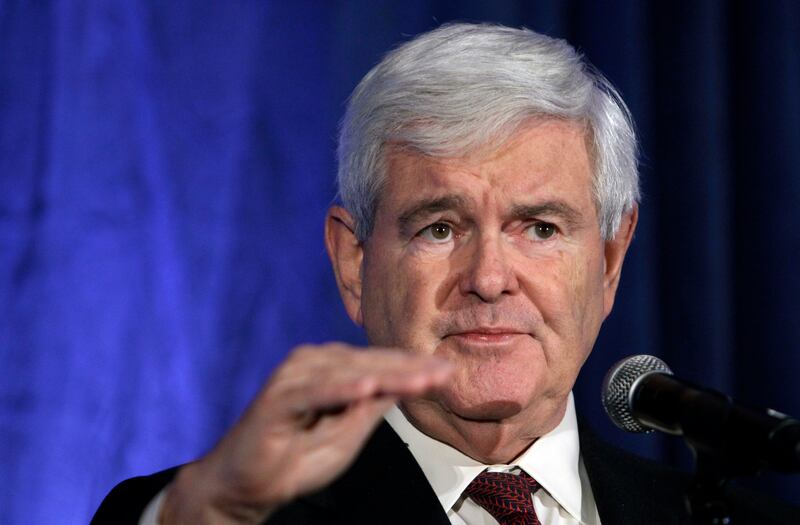SALT LAKE CITY — From his perch in Rome, former U.S. Speaker of the House Newt Gingrich sat for a podcast interview with Deseret News Opinion Editor Boyd Matheson last week and offered his impression of America’s response to the pandemic that included a stinging rebuke of the news media:
“The pattern of social media and the pattern of the news media makes it harder for all of us to find a way to try to make practical, common sense out of what we’re experiencing,” he said, building on observations of America while quarantined for 10 weeks in one of the pandemic’s hardest hit countries, 4,200 miles from equally crippled New York City.
“So, I think in that sense, I see things more like a historian. I look at stuff and I think, as a historian, that we have an enormous disservice bought from our news media, because they refused to take these things seriously and slow down and actually try to cover. If you watch President Trump’s interaction with these reporters, sometimes it’s pathetic because they go for the dumbest and lowest-quality question as though it makes any sense. And they skip a lot of big questions that should be asked.”
Perhaps it would be easy to discount the criticism coming from a battle-hardened conservative former political heavyweight pounding the drumbeat of a liberal media getting it wrong. But as a longtime journalist, and editor of this paper, I’m sitting up straight to consider his point of view about asking the wrong questions.
I think Gingrich is wrong about the media refusing to take the pandemic seriously. But for every story about flattening the curve should come an accounting of the modeling done which prompted the shutdown of the economy. We ran a comprehensive piece about the science behind flattening the curve in Utah on March 29. In today’s Deseret News we’re asking when a vaccine actually can be ready. But once ready, can you really inoculate the whole world? And should you rush a vaccine, or is there different behavior we can engage in to protect our families?
What are the right questions and can we use those answers to better understand how to deal with the pandemic now and in the future?
First, a bit of history.
Ronald Reagan finished an eight-year term as governor of California in 1975. In the years between the end of his governorship and his 1980 election to the presidency he did something quite remarkable. As my colleague Boyd Matheson tells it:
“He did a daily four minute radio spot, for three or four years, every day, with no staff. You could play most of them today and the issues are the same. He talked about North Korea and Russia and China,” Matheson said.
But he did something greater than talk issues. He talked values and he asked not just important questions, but the right questions about ourselves.
“He basically asked, ‘What are we for? What is our country for? Who are we?” Matheson said. He drove the answers straight to the White House and led to the end of the Cold War with the USSR and the tearing down of the Berlin Wall.
Gingrich and his colleague Dick Armey picked up on that strategy when they produced The Contract with America in 1994, flipping the House of Representatives to Republican for the first time in 40 years. Ignore for a moment your view of liberal policies vs. conservative policies. Simply look at the approach of asking a better question.
It’s counterproductive to lump the media into one collective group. The White House media corps gets the most visibility for its interaction with the president. That interaction clearly frustrates Gingrich and much of the country. It’s a national daily two-step between the president and reporters; it’s CNN vs. Fox vs. MSNBC.
“I think Newt Gingrich thinks in questions,” Matheson said to me as we discussed Gingrich’s take. “Whether you love his politics or hate them, or all his other flaws, he’s an incredible thinker and communicator. The reason he’s able to do that is he thinks in questions.”
When Reagan did his famous “It’s morning in America” campaign spots in 1984, the electorate could picture themselves in the story — watching a morning sunrise and being a part of the America they want to live in. The question was then, and now, how do we get it? And in the midst of a pandemic, who should take us there?
Journalists for the Wall Street Journal, the New York Times, Washington Post, as well as Western papers along the coast and here at the Deseret News, are telling important stories, heartbreaking stories. Deseret News reporter Katie McKellar’s reporting uncovered both why and how (what led to) Utah’s purchase of anti-malarial drugs for COVID-19 treatment.
Now the key questions are: What changes need to be put in place in Utah to prevent such a rush to buy an unproven drug? With a gubernatorial election season underway, what kind of leader does Utah want to have? And in the midst of the presidential race, should it be Joe Biden or Donald Trump?
Perhaps here is a better question: Why does only half of the electorate vote? Why are so many disengaged? Do the best candidates, the best leaders, rise to the top?
In the interview with Gingrich, the former House speaker didn’t just hit the media. He acknowledged missteps and misstatements by the president that sent journalists scrambling for answers. But every new day brings with it a new morning and a chance to ask a better question. That’s our goal here both in our news stories and in the opinion pieces Matheson oversees.
“Asking the right question is the hardest thing to do,” Matheson said. “Perhaps the only thing harder is listening for the right answer.”
Doug Wilks is editor of the Deseret News.


